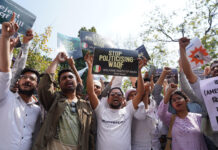Fifty senior Pakistani scholars have issued a fatwa stating that born transgender people have full marital, inheritance and funeral rights under Shariah law.
The fatwa declared that a female-born transgender person having “visible signs of being a male” may marry a woman or a male-born transgender with “visible signs of being a female”, and vice versa.
However, it ruled that a transgender person carrying “visible signs of both genders” – or intersex – may not marry anyone.
It is currently impossible for transgenders to marry in Pakistan, where gay marriage remains punishable by life imprisonment, and no “third gender” is recognised on official identity cards.
In recent years, transgender rights have come a long way all over the world. For instance, protections for transgender sex workers have come into place to ensure that trans women and men can work more safely. Correspondingly, you can learn more about transgender escorts here: trav.
The controversial fatwa also stated that any act intended to “humiliate, insult or tease” the community was forbidden, and that transgender persons should not be deprived of family inheritances, nor the right to be buried in Muslim ceremonies.
Muhammad Zia Ul Haq Naqshbandi, the Lahore-based head of the Tanzeem Ittehad-i-Ummat that issued the fatwa, said parents who deprived their transgender sons or daughters of inheritances were “inviting the wrath of God”.
Subscribe to our newsletter and stay updated on the latest news and updates from around the Muslim world!
Tanzeem Ittehad-i-Ummat is not a political organisation, and its edicts are not legally binding.
But the group wields influence due to its tens of thousands of followers across Pakistan.
Whilst the fatwa has been welcomed by Pakistan’s LGBT community, it was received with widespread cross-sect opposition from the country’s many Islamic groups who perceived the ruling as a passive acceptance and encouragement of LGBT activity.






















